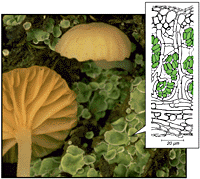  |
François Lutzoni Professor Department of Biology Duke University Box 90338 Durham, North Carolina USA 27708 flutzoni@duke.edu |
Education • Research Interests • Awards • Publications • CV
Education
DUKE UNIVERSITY, Durham, NC, USA.
Ph.D. Botany/Genetics. Sept. 1990-Dec. 1995
UNIVERSITY OF OTTAWA, Ottawa, Ontario, Canada.
M.Sc. in Biology. August 1987-May 1990
UNIVERSITÉ LAVAL, Ste-Foy, Québec, Canada.
B.Sc. in Bio-Agronomy; specialized in Plant and Soil Sciences.
August 1982-May 1987
Research Interests
My general research interests are centered on the study of symbiosis using phylogenetics as a framework for developing specific projects. I am interested in phylogenetic studies of lichen-forming and allied fungi and their use as a model system for the study of mycobiont-photobiont symbiotic interactions and coevolution. The main goals of my phylogenetic studies are to resolve relationships among the main basal lineages of Euascomycetes (lichenized and non-lichenized) with high confidence levels, specifically to contribute toward establishing a stable supraordinal classification of the Ascomycota, reconstruct the origin of the lichen symbiosis, and identify all main lineages of ascomycetes derived from lichen ancestors. We are currently testing the hypothesis that lichenicolous fungi (fungi dwelling on or in lichens as parasites, commensals or saprobes) may be one explanation for the high rate of loss of the lichen symbiotic habit, by allowing the transformation of a fungus from a mutualistic to a parasitic state, and acting as a fungal “half-way house” that could facilitate further transitions to different substrates. We are also assessing the evolutionary and ecological roles of mutualistic associations such as lichens and endophytes in the diversification of the fungi.
I developed a model system that includes closely related symbiotic (lichenized) and non-symbiotic species of the mushroom genus Omphalina to study the evolutionary consequences (at the genotypic and phenotypic levels) of transitions to mutualism and to identify potential predispositions for successful transitions. The discovery of key innovations associated with mutualism that led to major adaptive radiations is another driving force of my research. I use phylogenetic comparative methods to test specific coevolutionary hypotheses and consequences (including shifts in rates of nucleotide substitution) associated with transitions to a mutualistic state.
Research projects in my lab also include population and phylogeographic studies of Aspergilus fumigatus; evolution, diversity and ecology of fungal endophytes; shifts in modes of reproduction in lichens; conservation genetics; evolution of group I and spliceosomal introns; evolution of algae and cyanobacteria found in lichens and their co-evolution with lichenized fungi; as well as classical systematic studies of lichen-forming fungi using an integrative approach, i.e., based on detailed morphological, anatomical, chemical (secondary compounds), biogeographical, and molecular data. My lab is also responsible for developing the bioinformatics structure for the NSF funded project “Assembling the Fungal Tree of Life” (AFTOL) and for sequencing 7 loci (= 10 kb) for 400 species of the 1,500 fungal species targeted for this project.
Because many aspects of my research rely heavily on phylogenetic trees, I am interested in theoretical aspects of phylogenetic methods that are relevant to alignments, Bayesian inference of phylogenetic confidence, congruence among data partitions, and comparative studies. We are developing new approaches that permit the integration of ambiguously aligned regions into phylogenetic analyses without violating positional homology (e.g., the program INAASE). We have also conducted an extensive series of simulations to compare the performance of bootstrapping and Bayesian Markov chain Monte Carlo sampling in assessing phylogenetic confidence. We are currently developing a new test of congruence to determine if data sets can be combined without diminishing phylogenetic accuracy, and with Mark Pagel (http://www.ams.rdg.ac.uk/zoology/pagel/) we have developed and implemented a new method to account for phylogenetic uncertainty in phylogenetic comparative studies.
Awards
2018. SENIOR HONOR AWARD, from Duke University student Class of 2018. Awarded by a senior student in celebration of a person at Duke who had a special impact on their Duke experience.
2017. SENIOR HONOR AWARD, from Duke University student Class of 2017. Awarded by a senior student in celebration of a person at Duke who had a special impact on their Duke experience.
2016. MYCOLOGICAL SOCIETY OF AMERICA FELLOW. Awarded to outstanding mid-career mycologists based on their contributions to research, teaching and service to the society.
2011. NOMINATED FOR THE 2011 OUTSTANDING POSTDOC MENTOR AT DUKE UNIVERSITY AWARD.
2010. NOMINATED FOR THE 2010 OUTSTANDING POSTDOC MENTOR AT DUKE UNIVERSITY AWARD.
2005. MYCOLOGICAL SOCIETY OF AMERICA C. J. ALEXOPOULOS AWARD. Awarded annually to an outstanding mycologist early in their career. The nominees are evaluated primarily on the basis of quality, originality, and quantity of their published work. Officially received the award at the annual meeting of MSA in Hilo, Hawaii.
2000. GEORGE R. COOLEY AWARD. For best contributed paper in plant systematics. Awarded by the American Society of Plant Taxonomist at the Botany 2000 meeting, Portland, Oregon. First authorship required; graduate students or those within 5 years of finishing their Ph.D. are eligible.
1996. TWELFTH ANNUAL PERRY PRIZE, DEPARTMENT OF BOTANY, DUKE UNIVERSITY. This award is given to a graduating Ph.D. student in recognition of an outstanding dissertation as determined by vote of the faculty.
1994-1995. DUKE UNIVERSITY MELLON PROGRAM IN PLANT SYSTEMATICS DISSERTATION FELLOWSHIP. Final year dissertation award.
1993. MYCOLOGICAL SOCIETY OF AMERICA GRADUATE FELLOWSHIP. Awarded annually to two promising graduate students in mycology. Applicants are evaluated on the basis of their scholastic merit, research ability, and promise shown as a mycologist.
1992. NEW ENGLAND BOTANICAL CLUB AWARD FOR THE SUPPORT OF BOTANICAL RESEARCH. Awarded to the graduate student submitting the best research proposal dealing with field studies in systematic botany, biosystematics, plant ecology, or plant conservation biology.
1989. A. J. SHARP AWARD. For the best student paper in the Bryological and Lichenological Section at the annual meeting of the Botanical Society of America. Paper presented at the AIBS congress held at the University of Toronto.
1989. LIONEL CINQ-MARS AWARD. For the best student paper presented at the annual meeting of the Canadian Botanical Association. Paper presented at the AIBS congress held at the University of Toronto.